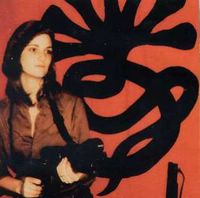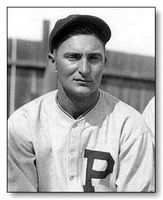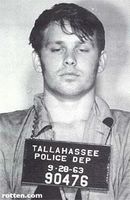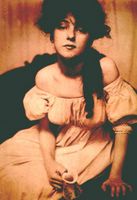Reel Short Reviews, Take 5
Another batch of movies recently seen or re-seen (four stars the maximum ranking, which means zero stars are -- you guessed it -- is the lowest possible).
American Pie (1999)
What can you say? As directed by the talented Paul Weitz, American Pie is several notches above the typical teen sex comedy, but it's a teen sex comedy, nonetheless, which means it's subject to all the well-worn cliches, gross-out humor and facile characters that you'd expect. Four high school guys make a pact to get laid before graduation, a Holy Grail of a quest that leads to several truly funny bits, particularly the baked good of the title and an Internet-friendly tryst between the hapless Jim (Jason Biggs) and a sexy Czech foreign exchange student (Shannon Elizabeth). Considering how Weitz's successive comedies, particularly About a Boy and In Good Company, focused on surrogate father-son relationships, it's interesting to see the genesis of that theme in the genuinely affecting interaction between Jim and his well-meaning, but awkward, dad (portrayed by the inimitable Eugene Levy).
***
The Battle of Algiers (1965)
Events of current-day Middle East make this film as relevant as it was upon initial release. Shot in a pseudo-documentary style in stunning black and white, the film tells the story of the revolution that resulted in Algeria's independence from France. Although Italian director Gillo Pontecorvo squarely sides with the FLN, the Algerian terrorists (or freedom fighters, take your pick) behind that insurgency, the movie's unflinching depiction of civilian bombings and random murder feels decidedly ambivalent nowadays. Some 40 years after its initial release stirred up controversy and was subsequently embraced by such revolutionaries as the Black Panthers, Battle of Algiers doesn't come off as flagrantly biased as it must have seemed to the French government, which banned it (chew on that irony for a while).
***1/2
Dirty Rotten Scoundrels (1988)
A remake of a little-known 1963 comedy called Bedtime Story, this Michael Caine-Steve Martin farce follows the crosses and doublecrosses of two con men who specialize in duping rich women along the French Riviera. Director Frank Oz has made his share of subpar comedies, but Dirty Rotten Scoundrels is a cut above most. It lags a bit in the second act, but most of it is fun and provides room for Caine and Martin to indulge the shticks they do best.
***
Donnie Darko (2001)
Writer-director Richard Kelly did not lack ambition in this cult film of a disturbed teenager tormented by a guy in an evil bunny costume. With its kitchen-sink storyline involving time travel, schizophrenia and alienated youth, Donnie Darko knocked me out when I first saw it. Alas, its considerable failings become more and more apparent with repeated viewings. Despite some memorably lyrical moments chronicling the descent of our hero (Jake Gyllenhaal), the plot is essentially barely coherent gibberish. Much of the dialogue is cringingly bad, the satire lacks bite (the adults are dumb and fake) and Kelly doesn't do his movie any favors devoting screen time to some awful, and extraneous, supporting performances, such as that of Darko executive producer Drew Barrymore. It is a shame, too, because when the film is most resonant -- as in scenes propelled by music from Tears for Fears, the Church and the like -- Donnie Darko is as weirdly seductive as teen angst.
**1/2
The Entertainer (1960)
Another early-Sixties British study in dour, working-class realism. Tony Richardson directed the film, in which Laurence Olivier recreated his famed stage role as third-rate vaudevillian Archie Rice. Not surprisingly, his performance is impeccable, and Joan Plowright is almost as good as Archie's long-suffering daughter (Olivier and Plowright married a year after shooting the film). But the talky script and unrelenting gloominess starts to suffocate the proceedings. It doesn't take long to realize Archie is an unrepentant screw-up and will continue to screw-up until the final credits roll.
***
The General (1927)
Certainly the most revered of Buster Keaton 's works, this classic -- equal parts adventure, romance and comedy -- is based on an actual train hijacking during the Civil War. Beautifully shot, surprisingly lyrical in parts and boasting some terrific stunts, The General is still a film easier to admire than appreciate.
***
The Incredibles (2004)
A nearly perfect Pixar product that comes courtesy writer-director Brad Bird, whose The Iron Giant in 1999 hinted at his sizable talent. The Incredibles reaches the Spielberg standard of excellence when it comes to straightforward, crowd-pleasing storytelling -- but that doesn't mean it skimps on sophistication or subtlety. In its tale of a family of superheroes struggling to be average, Bird parodies family dynamics, a litigious society, the complexities of hero worship, male midlife crisis and the narcisstic certainty of just knowing we could touch the stratosphere if our peers weren't weighing us down. There are some interesting insights to be found amid the jaw-dropping computer animation.
****
The King of Comedy (1983)
A blistering satire from Martin Scorsese still has every bit as much bite as it did when it opened (to criminally lukewarm box office) 22 years ago. Robert DeNiro stars as pathological fame-seeker Rupert Pupkin, whose idolatry of a late-night TV talk-show host (Jerry Lewis in a superb performance) leads to kidnapping. The film is one of Scorsese's best, and underrated, works. Not only does it skewer America's zeal for achieving celebrity without really doing anything to deserve it -- a jab more relevant in today's Reality-TV era than it was back in the '80s -- but it is also an exceedingly well-told story, expertly paced and peppered with the director's visual flair.
****
Mr. Death: The Rise and Fall of Fred A. Leuchter, Jr. (1999)
Fred Leuchter was a death geek, a self-styled expert on the implements of capital punishment. Documentary maker Errol Morris chronicles how the Massachusetts native became involved (perhaps unwittingly) with a group of Holocaust revisionists who hired Leuchter to go traipsing through the ruins of Auschwitz in hopes of confirming their insistence that there were no Nazi gas chambers. Morris paints Leuchter as a naive dupe; regardless, the man is too pompous and pathetic to elicit much sympathy. Subsequently, Morris' film is well made, but ultimately empty. You're not exactly sure what Morris found so compelling about this jackass of a subject.
***
The Philadelphia Story (1940)
I had forgotten what a wonderful movie this is, a true classic that -- aside from a few archaic social mores smacking of racism and misogyny (wife-beating must have been a funny concept for 1940 audiences) -- feels surprisingly contemporary. Its story of high society (and high maintenance) divorcee Tracy Lord and the men who love (and are frustrated by) her provides star turns from Katherine Hepburn, James Stewart and Cary Grant. The generally overlooked Ruth Hussey, incidentally, is excellent in the less-showy role as Stewart's work colleague/would-be love interest. Director George Cukor deserves great credit for maintaining a fast clip with a very talky and stagy script; it was initially a Broadway show, after all. But the dialogue of screenwriter David Ogden Stewart is (pardon the fey description) exquisite.
****
The Royal Tenenbaums (2001)
The best film to date from Wes Anderson is, loosely, about a cad of a husband and father who attempts to win back his brilliant, but dysfunctional, family. Like Anderson's other films, however, plot is of little consequence. He's more interested in quirkiness, weird detail and a strange brand of humanism. It works, for the most part, and it helps to have an outstanding cast with Gene Hackman a particular standout as the deceitful, no good patriarch, Royal Tenenbaum; Gwyneth Paltrow and Owen Wilson, who co-wrote the script with Anderson, are also damn good. There isn't really a great deal that actually goes on in Royal Tenenbaums, but its eccentricities, off-kilter pacing, twee soundtrack and hermetically sealed fantasy vision of New York all combine to make it (for me, anyway) irresistibly life-affirming.
***1/2
You Can't Cheat an Honest Man (1939)
When it comes to the great movie comedians from the Golden Age of Hollywood, few can rival the great W.C. Fields. And while You Can't Cheat an Honest Man is sub-par by Fields' standards -- he doesn't get nearly enough screen time, being the main problem -- it's enjoyable enough. The bulk of the movie served as a vehicle for Edgar Bergen and his favorite dummy, Charlie McCarthy.
**1/2























0 Comments:
Post a Comment
<< Home